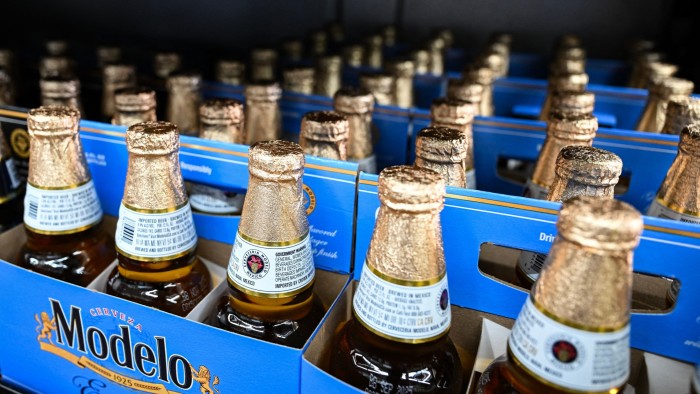Unlock the White House Watch newsletter for free
Your guide to what the 2024 US election means for Washington and the world
The biggest US brands and stores are losing business from Hispanic consumers as Donald Trump’s administration threatens mass round-ups of immigrants.
Companies including toothpaste and soap maker Colgate-Palmolive and Modelo beer brewer Constellation Brands have reported slower sales from the Hispanic community, which makes up a fifth of the US.
The slowdown presents a challenge for retail businesses confronting a sharp decline in consumer sentiment triggered by worries about the president’s sweeping tariffs on trading partners.
As Trump promises a crackdown on the estimated 11mn immigrants in the country illegally — many from Latin America — some are also hiding from authorities, missing out on opportunities to earn and spend.
‘What we’re seeing is not only a shift in consumption volume, but also consumption behaviour,” said Marshal Cohen, chief retail analyst at Circana, which compiles store checkout data and surveys consumers.
Circana reported Hispanic shoppers are spending less on discretionary items than other consumers, after two years of spending more. The decline has been most pronounced in purchases of apparel, footwear and accessories in southern border states such as California, Arizona and Texas, Cohen said.
At Walmart, the largest US retail chain, spending from low-income Hispanic consumers “meaningfully worsened in the early part of 2025”, said Simeon Gutman, a retail analyst at Morgan Stanley.
“The Hispanic-Latino drop-off is just more notable and more stark than any other cohort,” he said, citing the bank’s analysis of survey data from Numerator, a market research firm.
Constellation Brands’ breweries in Mexico produce Modelo Especial — the top-selling beer in the US — and other brands such as Corona and Pacifico. This week the company cut sales growth guidance for beer.
Hispanic consumers account for 50 per cent of Constellation’s beer business.
Chief executive William Newlands said: “The fact is a lot of consumers in the Hispanic community are concerned right now. Two-thirds of them are concerned about higher prices on things like food, gas and other essentials. Over half are concerned relative to immigration issues.”
Constellation cited data showing activity in physically demanding jobs such as construction and agriculture had weakened.
“A number of them are concerned about job losses in industries that have a high Latino employment base,” he added. “And what does that do? That has tended to mean that the consumer has pulled back on spending on a number of categories,” such as restaurants, consumer goods, clothing and travel.
Cases of Modelo and Corona were stacked high this week inside the Moreno’s Liquors store in Little Village, a largely Mexican neighbourhood of Chicago.
Co-owner Mike Moreno Jr said sales began to decline last year as inflation cut into family budgets, but business has slowed “drastically” in recent months as Trump’s threat of mass deportations and enforcement took effect. “People are scared,” he said.
Stubborn inflation has squeezed many US consumers, especially poorer ones, and Hispanic household income is below the national average. Amid concerns about high prices, “there obviously is an impact on Hispanic demand as we’ve seen lower traffic from Hispanic consumers”, John Faucher, Colgate-Palmolive’s chief investor relations officer, said at a conference last month.
Trump took office promising the largest deportations in US history. Federal border and immigration agents are making more arrests and officials have publicised visits to detention sites such as the maximum-security prison in El Salvador where hundreds were flown last month, including a man sent there erroneously.
This week Trump officials signed a deal to allow the federal Immigration and Customs Enforcement agency to send the names and addresses of unauthorised residents to the Internal Revenue Service to match against tax records.
Eric Rodriguez, senior vice-president at UnidosUS, a Hispanic civil rights and advocacy group, said: “The potential that you could lose your job if you are detained, the threat that employers feel if their workers are targeted in some ways, is creating the conditions of major economic instability for these families.”
Shoe Carnival, a New York-listed footwear chain with hundreds of stores concentrated in the US south and Midwest, last month reported a decline in same-store sales and warned of difficulties ahead.
“We anticipate that pressure continues this year with a lower-income customer, uncertainty of tariffs, and increased volatility with Hispanic customers,” said Mark Worden, chief executive.
Read the full article here

